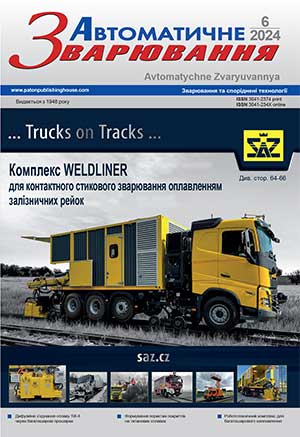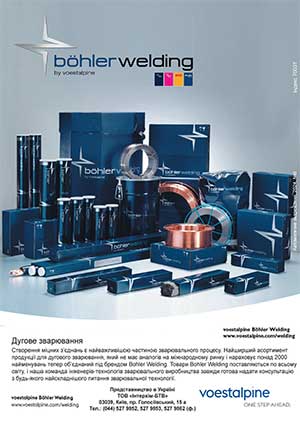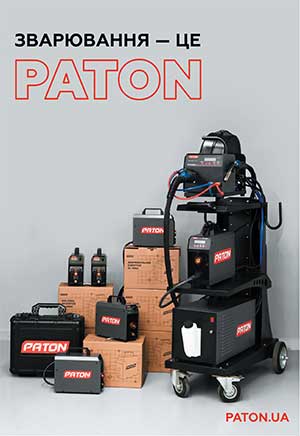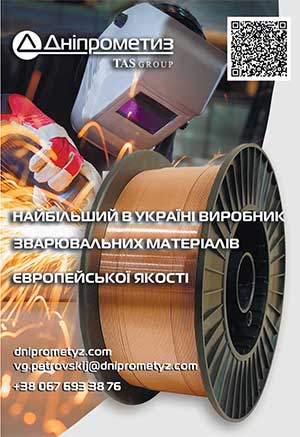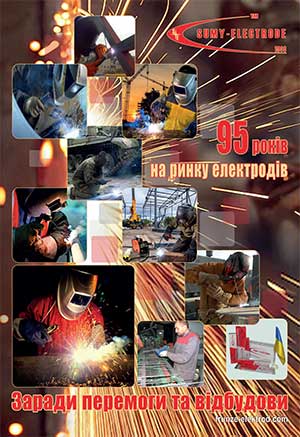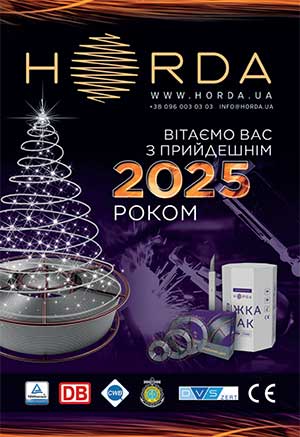| 2024 №06 (01) |
DOI of Article 10.37434/as2024.06.02 |
2024 №06 (03) |
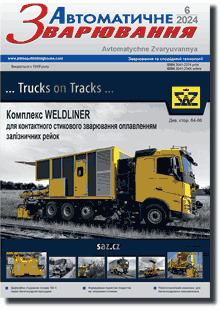
"Avtomatychne Zvaryuvannya" (Automatic Welding), #6, 2024, pp. 10-16
Coating for medical application produced by microplasma spraying from Zr-Nb alloy
S.Yu. Maksymov1, S.G. Voinarovych1, S.N. Kaliuzhnyi1, O.N. Kyslytsia1, I.S. Sviridova1, D.L. Alontseva2, R. Yamanoglu3
1E.O. Paton Electric Welding Institute of the NAS of Ukraine. 11 Kazymyr Malevych Str., 03150, Kyiv, Ukraine. E-mail: serge.voy@gmail.com2D. Serikbayev East Kazakhstan Technical University. 69 Protosanov Str., 070004, Ust-Kamenogorsk, Kazakhstan.
3Department of Metallurgical and Materials Engineering, College of Engineering, Kocaeli University, Kocaeli 41380, Turkey. E-mail: ryamanoglu@kocaeli.edu.tr
The work deals with the technology of microplasma spraying of biocompatible coatings from Zr-Nb alloy and their properties. On the surface of the porous Zr-Nb coating with the most developed surface microrelief, the presence of both open macropores of up to 300 μm in size and micropores of up to 10 μm in size was revealed. The X-ray phase analysis of the formed Zr-Nb coatings showed the presence of phases of α-solid solution of Zr, oxide (ZrO2), nitride (ZrN) and carbide (ZrNbC2). The corrosion resistance of the microplasma Zr-Nb coating and Ti6Al4V alloy in a solution of 0.9 % NaCl, which simulates the environment of the human body, was determined. It is assumed that the Zr-Nb alloy coatings produced by microplasma spraying on the surfaces of existing Ti6Al4V endoprostheses will allow for future improvement of corrosion resistance and osseointegration between the bone and the implant. 26 Ref., 2 Tabl., 5 Fig.
Keywords: microplasma spraying, biocompatible coating, Zr-Nb alloy, surface morphology, adhesion strength, corrosion resistance
Received: 09.09.2024
Received in revised form: 29.10.2024
Accepted: 13.12.2024
References
1. Abd-Elaziem, W., Darwish, M.A., Hamada, A., Daoush, W.M. (2024) Titanium-based alloys and composites for orthopaedic implants applications: A comprehensive review. Materials & Design, 241, 112850. https://doi.org/10.1016/j.matdes.2024.1128502. Quinn, J., McFadden, R., Chan, C.-W., Carson, L. (2020) Titanium for orthopaedic applications: An overview of surface modification to improve biocompatibility and prevent bacterial biofilm formation. Science, 23(11), 101745. https://doi.org/10.1016/j.isci.2020.101745
3. Tepla, T., Pleshakov, E., Sieniawski, J., Bohun, L. (2022) Causes of degradation of titanium dental implants. Ukrainian J. of Mechanical Engineering and Mater. Sci., 8(4), 31-40. https://doi.org/10.23939/ujmems2022.04.031
4. Wang, H., Liu, J., Wang, C. et al. (2020) The synergistic effect of 3D-printed microscale roughness surface and nanoscale feature on enhancing osteogenic differentiation and rapid osseointegration. J. of Mater. Sci. & Technology, 63, 18-26. https://doi.org/10.1016/j.jmst.2019.12.030
5. Alontseva, D.L., Ghassemieh, E., Voinarovych, S. et al. (2019) Characterisation of the microplasma spraying of biocompatible coating of titanium. J. of Microscopy, 279(3), 148-157. https://doi.org/10.1111/jmi.12849
6. Woźniak, A., Staszuk, M., Reimann, Ł. et al. (2021) The influence of plasma-sprayed coatings on surface properties and corrosion resistance of 316L stainless steel for possible implant application. Archives of Civil and Mechanical Engineering, 21(4), 148. DOI: https://doi.org/10.1007/s43452-021-00297-1 https://doi.org/10.1007/s43452-021-00297-1
7. Mehjabeen, A., Song, T., Xu, W. et al. (2018) Zirconium alloys for orthopaedic and dental applications. Advanced Engineering Materials, 20(9), 1800207. https://doi.org/10.1002/adem.201800207
8. Zhou, F.Y., Wang, B.L., Qiu, K.J. et al. (2012) Microstructure, mechanical property, corrosion behavior, andin vitrobiocompatibility of Zr-Mo alloys. J. of Biomedical Materials Research Pt B: Applied Biomaterials, 101B(2), 237-246. https://doi.org/10.1002/jbm.b.32833
9. Stich, T., Alagboso, F., Křenek, T. et al. (2021) Implant-bone-interface: reviewing the impact of titanium surface modifications on osteogenic processes in vitro and in vivo. Bioengineering & Translational Medicine, 7, e10239. https://doi.org/10.1002/btm2.10239
10. Cheikho, K., Laurent, C., Ganghoffer, J.F. (2022) An advanced method to design graded cylindrical scaffolds with versatile effective cross-sectional mechanical properties. J. of the Mechanical Behavior of Biomedical Materials, 125, 104887. https://doi.org/10.1016/j.jmbbm.2021.104887
11. Wang, R., Ni, S., Ma, L., Li, M. (2022) Porous construction and surface modification of titanium-based materials for osteogenesis: A review. Frontiers in Bioengineering and Biotechnology, 10, 973297. https://doi.org/10.3389/fbioe.2022.973297
12. Wang, H., Liu, J., Wang, C. et al. (2020) The synergistic effect of 3D-printed microscale roughness surface and nanoscale feature on enhancing osteogenic differentiation and rapid osseointegration. J. of Mater. Sci. & Technol., 63, 18-26. https://doi.org/10.1016/j.jmst.2019.12.030
13. Li, B.E., Li, Y., Min, Y. et al. (2015) Synergistic effects of hierarchical hybrid micro/nanostructures on the biological properties of titanium orthopaedic implants. RSC Advances, 5(61), 49552-49558. https://doi.org/10.1039/C5RA05821J
14. Cheng, B., Niu, Q., Cui, Y. et al. (2017) Effects of different hierarchical hybrid micro/nanostructure surfaces on implant osseointegration. Clinical Implant Dentistry and Related Research, 19(3), 539-548. https://doi.org/10.1111/cid.12471
15. Matsuzaka, K., Frank Walboomers, X., Yoshinari, M. et al. (2003) The attachment and growth behavior of osteoblast-like cells on microtextured surfaces. Biomaterials, 24(16), 2711-2719. https://doi.org/10.1016/S0142-9612(03)00085-1
16. Nakashima, Y., Hayashi, K., Inadome, T. et al. (1997) Hydroxyapatite-coating on titanium arc sprayed titanium implants. J. of Biomedical Materials Research, 35(3), 287-298. https://doi.org/10.1002/(SICI)1097-4636(19970605)35:3<287::AID-JBM3>3.3.CO;2-U
17. Jahani, B. (2021). The effects of surface roughness on the functionality of Ti13Nb13Zr orthopedic implants. Biomedical J. of Scientific & Technical Research, 38(1), 30058-30067. https://doi.org/10.26717/BJSTR.2021.38.006104
18. Lewallen, E.A., Trousdale, W.H., Thaler, R. et al. (2021) Surface roughness of titanium orthopaedic implants alters the biological phenotype of human mesenchymal stromal cells. Tissue Engineering Pt A, 27, 1503-1516. https://doi.org/10.1089/ten.tea.2020.0369
19. Borisov, Yu.S., Kislitsa, A.N., Vojnarovich, S.G. (2006) Peculiarities of the process of microplasma wire spraying. The Paton Welding J., 4, 21-25.
20. Voinarovych, S.G., Alontseva, D.L., Kyslytsia, O.N. et al. (2021) Fabrication and characterization of Zr microplasma sprayed coatings for medical applications. Advances in Mater. Sci., 21(2), 93-105. https://doi.org/10.2478/adms-2021-0013
21. Fousova, M., Vojtech, D., Jablonska, E. et al. (2017) Novel approach in the use of plasma spray: Preparation of bulk titanium for bone augmentations. Materials, 10(9), 987. https://doi.org/10.3390/ma10090987
22. Alontseva, D., Ghassemieh, E., Voinarovych, S. et al. (2020) Manufacturing and characterisation of robot assisted microplasma multilayer coating of titanium implants: biocompatible coatings for medical implants with improved density and crystallinity. Johnson Matthey Technology Review, 64(2), 180-191. https://doi.org/10.1595/205651320X15737283268284
23. Cheikho, K., Laurent, C., Ganghoffer, J.F. (2022) An advanced method to design graded cylindrical scaffolds with versatile effective cross-sectional mechanical properties. J. of the Mechanical Behavior of Biomedical Materials, 125, 104887. https://doi.org/10.1016/j.jmbbm.2021.104887
24. Rosalbino, F., Macciò, D., Scavino, G. (2023) Corrosion behaviour of Zr-Ag alloys for dental implant application. Mater. Sci. and Applications, 14(11), 501-514. https://doi.org/10.4236/msa.2023.1411033
25. Kirichenko, V.G. (2015) Nuclear physics of metal sciences of power engineering alloys. Chapt. 1, Kharkiv, KhNU [in Russian]
26. Peron, M., Bertolini, R., Cogo, S. (2022) On the corrosion, stress corrosion and cytocompatibility performances of ALD TiO2 and ZrO2 coated magnesium alloys. J. of the Mechanical Behavior of Biomedical Materials, 125, 104945. https://doi.org/10.1016/j.jmbbm.2021.104945
Advertising in this issue:
The cost of subscription/purchase order journals or individual articles
| Journal/Currency | Annual Set | 1 issue printed |
1 issue |
one article |
| TPWJ/USD | 384 $ | 32 $ | 26 $ | 13 $ |
| TPWJ/EUR | 348 € | 29 € | 24 € | 12 € |
| TPWJ/UAH | 7200 UAH | 600 UAH | 600 UAH | 280 UAH |
| AS/UAH | 1800 UAH | 300 UAH | 300 UAH | 150 UAH |
| AS/USD | 192 $ | 32 $ | 26 $ | 13 $ |
| AS/EUR | 180 € | 30 € | 25 € | 12 € |
| SEM/UAH | 1200 UAH | 300 UAH | 300 UAH | 150 UAH |
| SEM/USD | 128 $ | 32 $ | 26 $ | 13 $ |
| SEM/EUR | 120 € | 30 € | 25 € | 12 € |
| TDNK/UAH | 1200 UAH | 300 UAH | 300 UAH | 150 UAH |
| TDNK/USD | 128 $ | 32 $ | 26 $ | 13 $ |
| TDNK/EUR | 120 € | 30 € | 25 € | 15 € |
AS = «Automatic Welding» - 6 issues per year;
TPWJ = «PATON WELDING JOURNAL» - 12 issues per year;
SEM = «Electrometallurgy Today» - 4 issues per year;
TDNK = «Technical Diagnostics and Non-Destructive Testing» - 4 issues per year.





